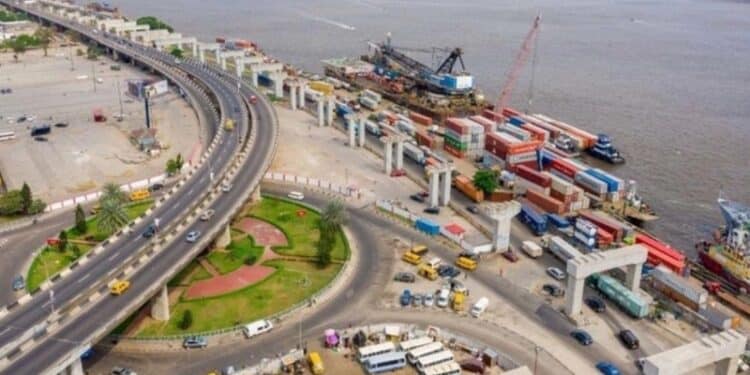African countries have tremendous economic potential, with rewarding opportunities for investors and partners. Are you looking for the best African countries to invest in to foster economic growth? Consider the below countries with the highest Gross Domestic Product (GDP) for better investment returns. With these countries, you surely can benefit from substantial investment opportunities.
1. Nigeria
Nigeria had a remarkable year after missing the Rand Merchant Bank list of countries to invest in 2021. The country’s gross domestic product stood at $514 billion in 2021, thus emerging as the African country with the highest GDP, according to Statista. Nigeria’s GDP rose by 4.03% in Q3 of 2021, according to the National Bureau of Statistics (NBS).
The numbers represent the fourth consecutive growth quarter but slower growth compared to the 5.01% recorded in Q2 of 2021. According to Trading Economics, communication, information and services represent 10% of the total output. Agriculture, natural gas, and crude petroleum account for 11%, while construction, industry, and main exports account for 16% of GDP.
2. Egypt
According to the World Population Review, Egypt has a population of over 105 million. A report by Reuters indicates that Egypt’s economy soared by 9.8% in Q1 of the 2021-22 fiscal year that started in July 2021. Available statistics show Egypt as one of the wealthiest African countries by total GDP for 2021.
Specifically speaking, Egypt has the second-highest GDP in Africa at $394 billion, according to Statista. Despite the pandemic’s effects, Egypt’s GDP grew in 2021. The country has a mixed economy profiting from fossil fuels, agriculture, and tourism, ideal for investors.
3. South Africa
According to Trading Economics, South Africa is the most developed country in Africa, with services representing 73% of its GDP. Available data show that South Africa’s GDP in 2021 stood at $329.53 billion. The country’s GDP benefits from business and government services, real estate, finance, communication, transport, and more.
Also, available data by Bloomberg indicate that Africa’s most industrialized economy could grow by 2% in 2022 and 2.1% in 2023. With the largest stock exchange on the continent, macro-economic stability and rewarding opportunities in social services expenditure.
4. Algeria
Algeria’s renewable energy, tourism and liquidity reserve are foreign direct investment points. The country’s economy relies on oil and gas, amounting to 60% of the state budget. Information from Statista shows that the Northern Africa country has a GDP of $151.46 billion as of 2021.
With recent laws encouraging foreign investments, the nation offers rewarding business opportunities to investors.
5. Morocco
Available records show Morocco as the 5th largest economy by GDP on the African continent. According to Statista, Morocco’s GDP stood at $124 billion as of 2021. Agriculture, investments, government, and the housing sector are factors determining the growth. There are indications that the country’s economic growth will rise to 3.2% in 2022.
The country’s economy is liberal, driven by the laws of demand and supply.
6. Kenya
Kenya arguably has the most advanced economy in Central and East Africa. According to the World Bank’s forecast, the country’s resilient economy could grow at 4.9% in 2022, thanks to sound economic policies, management, and diversified sources.
Trading Economics projects that Kenya’s GDP could grow beyond its current level in 2021 to $107 billion in 2022 and $110 billion in 2023. With high demand for goods and services, a robust economy, and a favorable business environment, Kenya is ideal for investments in 2022.
7. Ethiopia
Ranked as the second-largest African flower exporter and among the biggest producers of coffee worldwide, Ethiopia is rewarding for investors. According to the World Bank, the country has a population of over 115 million people. The country’s economy recorded a 6.1% growth between financial years 2019 and 2020. The country’s GDP stood at $93.97 billion, despite the ongoing war in the country.
Investors can benefit from Reuter’s prediction that the Ethiopian economy will expand in 2022 by 8.7%.
8. Ghana
According to a Worldometer report, Ghana has a population of over 30 million. Statistics from Nairametrics show that Ghana’s economy experienced a 3.9% expansion and 6.6% growth in Q3 of 2021. The report described the growth as Ghana’s fastest GDP growth rate since the Covid-19 outbreak.
As of year-end 2021, the country’s GDP stood at $74.26 billion, according to Statista.
According to a report by CNBC Africa, Ghana is targeting a 5.8% GDP growth with benefits primarily driven by cocoa beans, crude oil, and minerals production.
9. Angola
Angola is rich in oil and gas resources and agricultural lands. Investment risks and opportunities report in Angola suggest that the country is the second-largest oil producer in Africa. According to Statista, Angola has a GDP of $66.49 billion. Trading Economics has forecast that the country’s GDP could cross $100 billion by 2022.
Trade, transportation, storage, construction, and fisheries contribute to Angola’s GDP growth. These sectors represent growth opportunities for investors.
10. Ivory Coast
Regarded as one of the fastest-growing economies in Africa, Ivory Coast is a top destination for investors in West Africa. Available statistics show that the country is a business portal with rewarding opportunities for investors. According to Statista, Ivory Coast’s GDP in 2021 stood at $70.99 billion.
Information from the African Development Bank shows that the Ivorian GDP could grow by 6.5% in 2022. The report further disclosed that transport, construction, agriculture, and petroleum products are driving the growth.
Conclusion
Now that you know the top countries to invest in 2022, consider doing your research before investing. Consider the business environment and political factors before investing your money. Instead of investing without knowledge, conduct adequate research on the growth, liquidity, and risk factors to avoid capital loss. Also, it’s essential to consider other factors such as corporate tax, exchange rate, inflation, and financial crisis.











